Cocos Nucifera in Shampoo: Unveiling Natural Hair Care Benefits
Coconut oil, derived from Cocos nucifera, has been identified as a beneficial ingredient in shampoo formulations, lending its rich properties to personal care products. Its natural composition includes fatty acids known for their moisturizing and conditioning effects, making it a desirable choice for hair care. Beyond hydration, coconut oil's unique molecular structure allows it to penetrate the hair shaft, enhancing strength and elasticity.
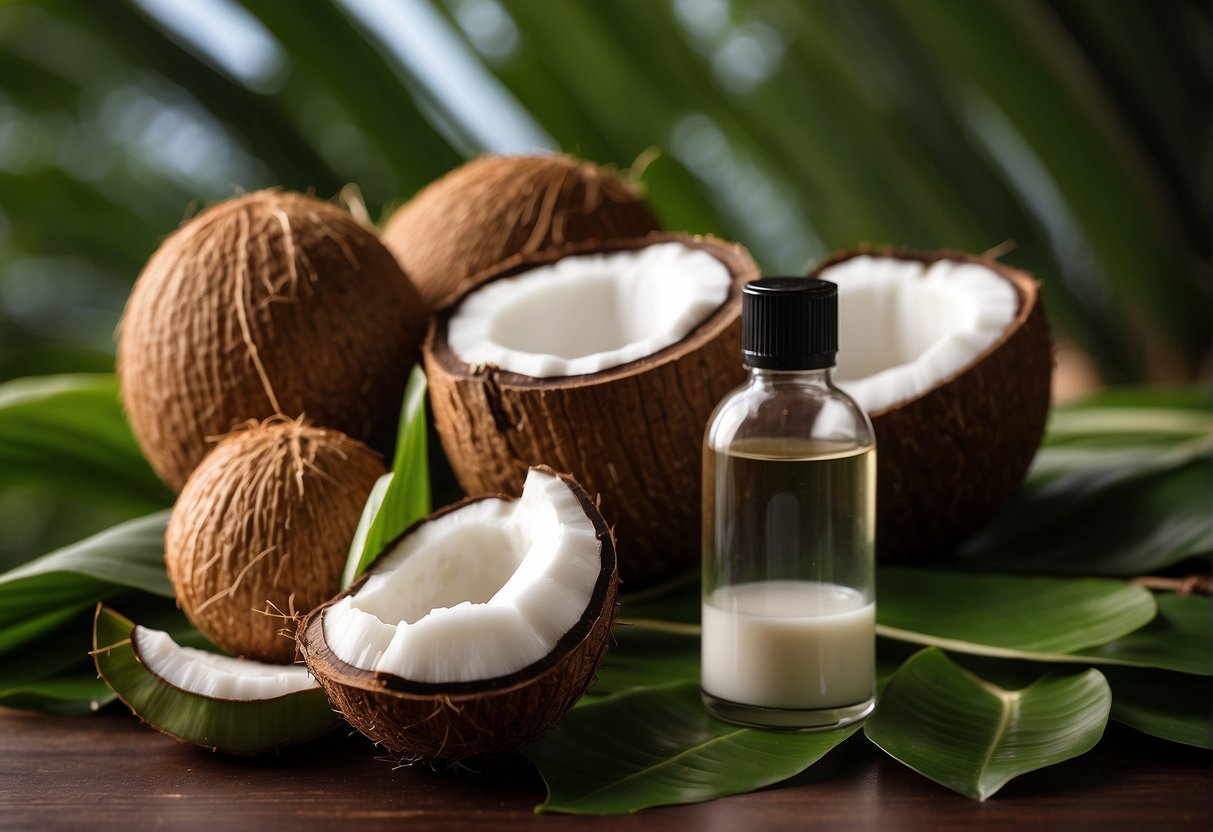
Our exploration into coconut oil in shampoos reveals a trend towards natural and active ingredients in personal care, with many brands incorporating Cocos nucifera oil for its purported hair benefits. As consumers become more conscious of the products they use, the demand for shampoos that utilize natural oils like coconut has increased, prompting more research into their efficacy and benefits.
Developing shampoos with coconut oil involves a delicate balance to maintain the oil's inherent benefits while ensuring the product cleanses effectively and feels pleasant to use. The versatility of coconut oil allows for various formulations that cater to different hair types and needs, from moisturizing dry hair to treatment-focused shampoos targeting scalp conditions.
Key Takeaways
- Coconut oil is widely valued in shampoos for its moisturizing properties and ability to fortify hair.
- There is a significant shift towards shampoos with natural ingredients like Cocos nucifera oil due to its hair and scalp benefits.
- Effective shampoo formulation with coconut oil aims to leverage its qualities while ensuring a pleasant user experience.
Composition and Properties of Coconut Oil
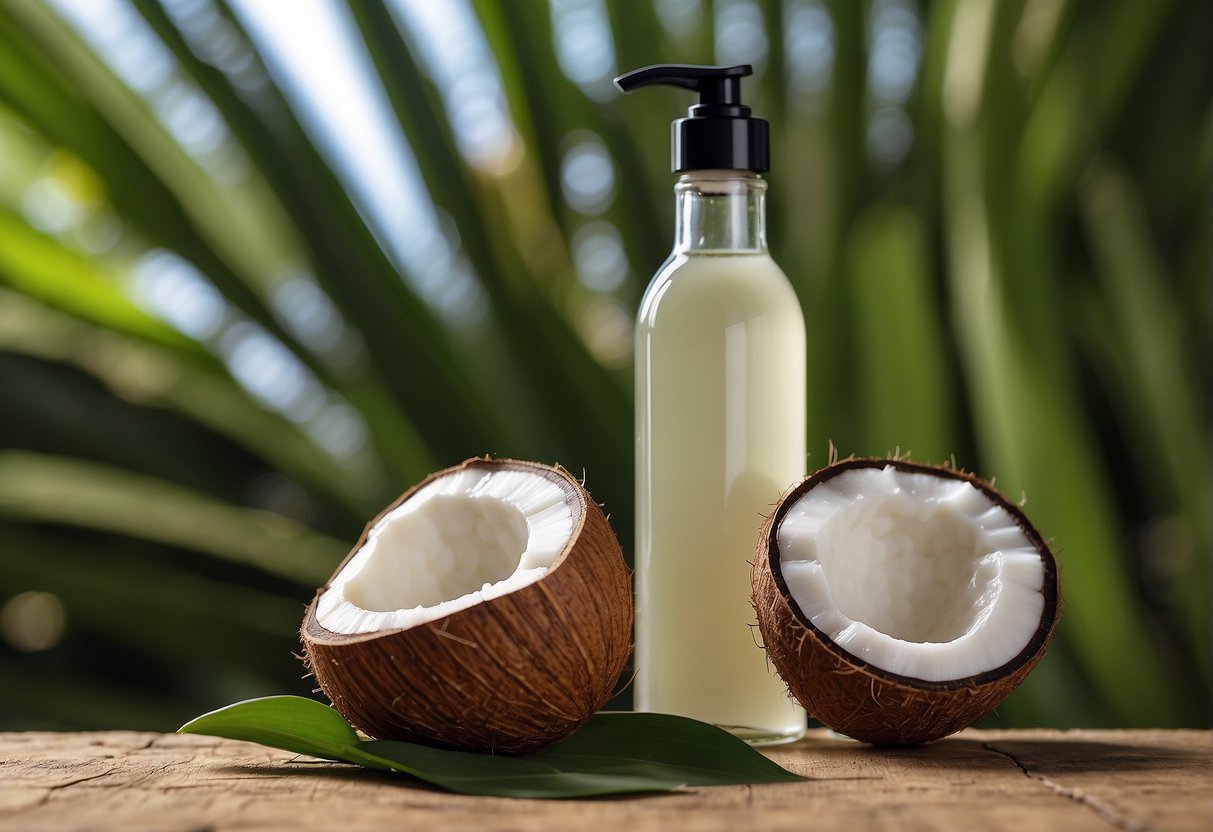
In our exploration of the uses of Cocos nucifera (coconut oil) in shampoo formulations, we focus on its distinctive fatty acid composition, its antimicrobial properties, mainly due to lauric acid, and its ability to hydrate and nourish the hair and scalp.
Fatty Acids and Nutrient Content
Coconut oil is comprised predominantly of medium-chain fatty acids (MCFAs), which are known for their ease of absorption and metabolism. The primary fatty acid in coconut oil is lauric acid, which constitutes about 47-53% of its total fatty acid content. Other significant components include myristic, palmitic, caprylic, and capric acids. These saturated fatty acids grant coconut oil a stable structure and long shelf life. In addition to fatty acids, coconut oil contains antioxidants, as well as vitamins E and K, which are beneficial for maintaining scalp and hair health.
Lauric Acid and Antimicrobial Benefits
Lauric acid, a 12-carbon long-chain fatty acid, is a remarkable component of coconut oil due to its antimicrobial properties. When lauric acid is enzymatically hydrolyzed in the body, it forms monolaurin, a compound that can effectively combat bacteria, fungi, and viruses. This characteristic makes coconut oil a valuable ingredient in shampoo formulations, as it can help to manage scalp conditions and prevent infections. The high content of lauric acid sets coconut oil apart from other oils like mineral oil, which lack these antimicrobial benefits.
Hydrating Effects on Hair and Scalp
Our hair and scalp can greatly benefit from the moisture-retaining properties of coconut oil. Due to its low molecular weight and linear chain structure, the oil penetrates the hair shaft, providing deep moisture and reducing protein loss from the hair. This hydration is essential in maintaining the hair's flexibility and strength, leading to less breakage and increased shine. Unlike mineral oil, which sits on the surface of the hair, coconut oil's moisturizing effects are more profound and lasting, contributing to overall hair and scalp health.
Benefits of Coconut Oil in Shampoo
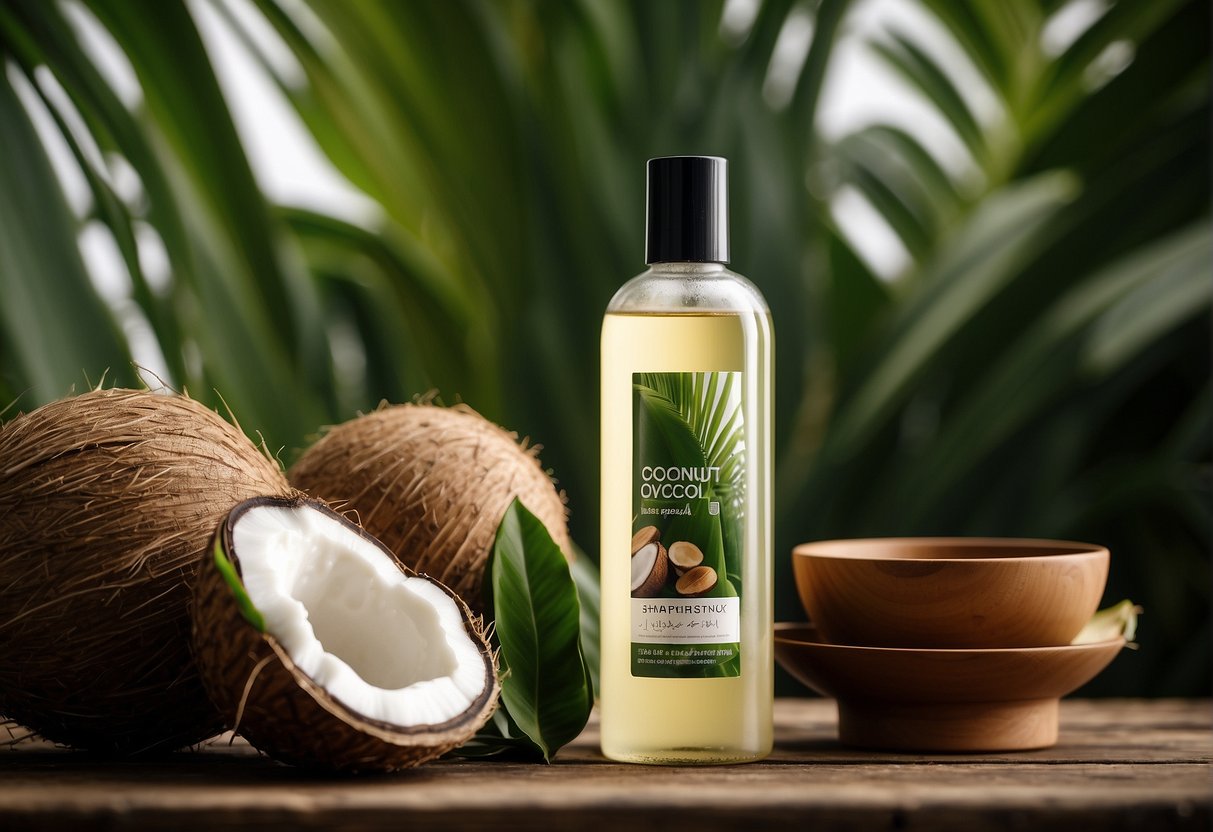
Incorporating coconut oil into shampoo formulations brings specific advantages to hair care, centering on hydration, strength, and scalp health. We'll explore how its natural properties make coconut oil a valuable component in hair shampoos.
Enhancing Hair Strength and Texture
Coconut oil is known for its ability to penetrate the hair shaft and reduce protein loss, which can lead to stronger hair. By reinforcing the hair's natural fiber, coconut oil in shampoo helps improve hair texture, making it softer and more manageable. This natural ingredient is particularly beneficial for those with damaged or weak hair strands, aiming to restore hair's vitality.
Moisturizing Dry Hair and Scalp
As a natural moisturizer, coconut oil is excellent for treating dry hair and scalp. It provides essential hydration that helps in maintaining the moisture balance of the hair. When used in shampoos, coconut oil can help combat dryness and bring a healthy sheen to dull hair. By moisturizing the scalp, it also helps to prevent flakiness and the itchiness often associated with dry scalp conditions.
Combating Dandruff and Scalp Conditions
The antimicrobial properties of coconut oil are not just advantageous for keeping the hair clean, but also for addressing scalp conditions like dandruff. The oil's natural components may assist in reducing yeast levels on the scalp, which are often linked to dandruff. Regular use of coconut oil-infused shampoo can help maintain a healthy scalp environment and keep dandruff at bay.
Formulating Shampoos with Cocos Nucifera

In integrating Cocos nucifera, commonly known as coconut oil, into shampoo formulations, we leverage its nourishing properties. Our focus is twofold: enhancing hair health and ensuring effective cleaning.
Natural Ingredients and Active Agents
When we select natural ingredients for our shampoos, Cocos nucifera oil stands out for its rich content of fatty acids and its natural affinity for hair protein. It functions as both a moisture retainer and an active agent that delivers nutrients to the hair and scalp. We carefully balance these active ingredients to maximize the conditioning benefits without weighing down the hair.
Surfactants and Cleansing Efficacy
Our choice of surfactants is critical for developing a shampoo that lathers well and cleanses effectively without stripping hair of its natural oils. We commonly employ mild surfactants that pair well with Cocos nucifera oil to prevent the scalp's natural biome from being disrupted. This combination ensures that while the hair is cleansed, the oil's beneficial properties are also imparted.
Conditioners and Moisturizers for Hair Care
Conditioning agents from Cocos nucifera not only smooth the hair cuticle to reduce frizz but also penetrate the shaft to moisturize from within. Our formulations include a deliberate ratio of Cocos nucifera oil to other emollients and humectants, creating a balanced conditioner that promotes elasticity and reduces breakage, leading to healthier looking hair.
Shampoo Variations and Personal Care
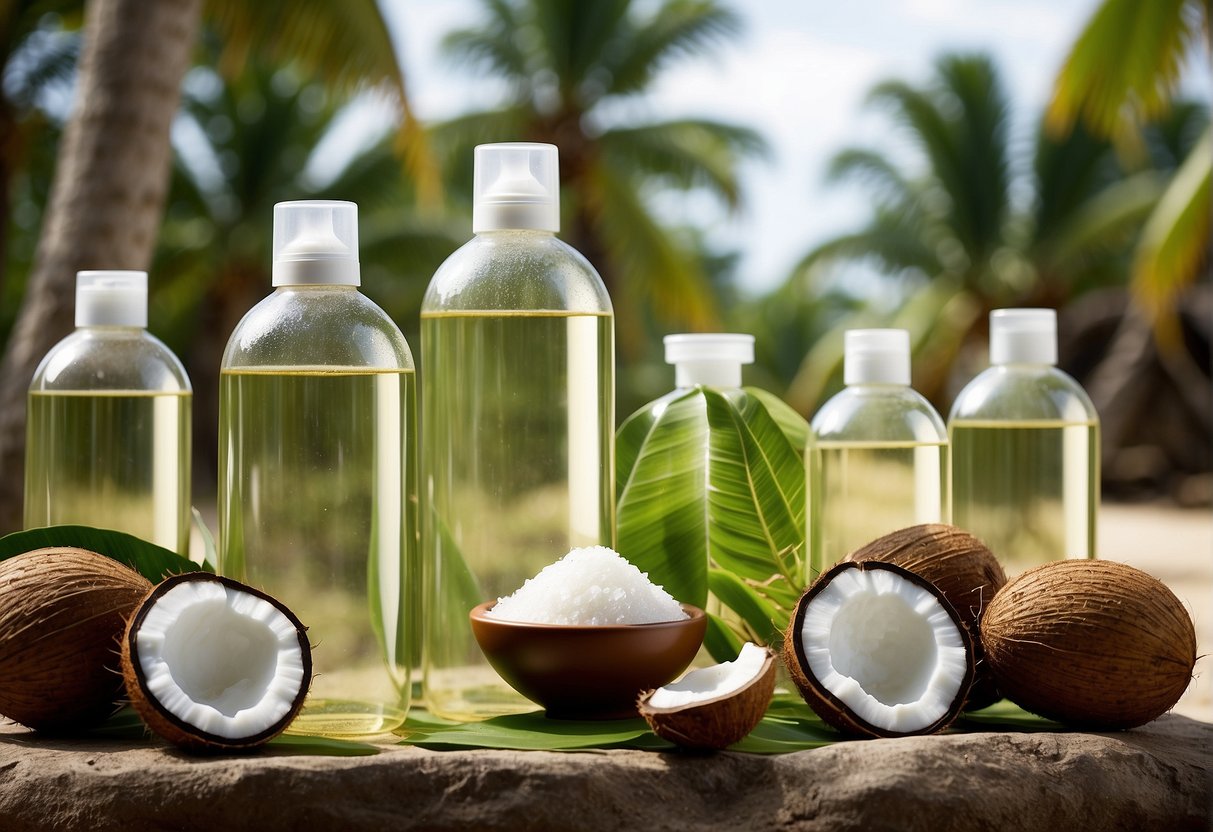
In this section, we'll explore how shampoo formulations with Cocos nucifera cater to diverse hair needs, take into account skin sensitivities, and present innovative shampoo forms. The use of coconut oil in shampoos signifies a turn towards natural ingredients in hair care.
Shampoos for Different Hair Types
We recognize that hair is not a one-size-fits-all matter, so shampoos with coconut oil come in various formulations for different hair types. For dry hair, shampoos containing Cocos nucifera oil can provide essential moisture to reduce frizz and improve hair texture. Here is a breakdown:
- Normal Hair: Balanced formulas that cleanse without stripping natural oils.
- Dry Hair: Enhanced with hydrating agents to lock in moisture.
- Oily Hair: Lightweight options that regulate sebum production without over-drying.
Considerations for Sensitive Skin and Allergies
We understand the importance of gentle care for those with sensitive skin. Shampoos with coconut oil are often formulated to be less harsh, as the pH level can impact skin irritation. Key points for sensitive users:
- Fragrance-Free Options: To minimize the risk of allergies and irritation.
- No Sulfates or Parabens: Safer for sensitive scalps, reducing the chance of allergic reactions.
We suggest patch tests for people with history of skin reactions, as even natural ingredients can cause allergies.
Innovations in Shampoo Forms and Applications
Adapting to the evolving hair care market, we find innovative forms of shampoos that incorporate Cocos nucifera:
- Shampoo Bars: A sustainable and travel-friendly option with concentrated coconut oil.
- Liquid Formulas: Traditional and versatile, varying in concentration for different care needs.
Such forms often aim to reduce the environmental impact while providing personalized hair care.
Thus, our exploration of shampoos shows a commitment to diversifying personal care while considering the functional benefits of coconut oil.
Usage Tips and Best Practices
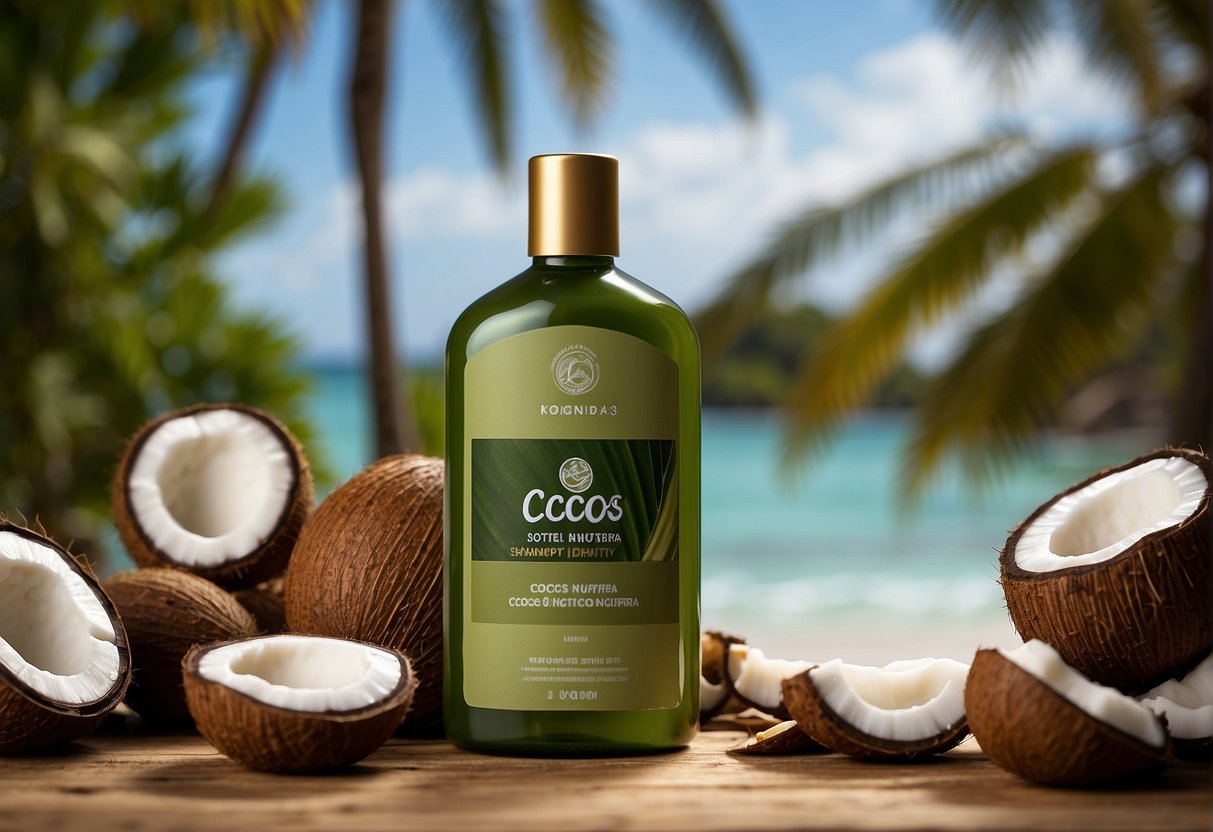
In this section, we'll guide you through the effective incorporation of Cocos nucifera (coconut oil) into your hair care regimen and how it can address common hair concerns when used in shampoo formulations.
Application and Hair Care Routine
Applying shampoo infused with Cocos nucifera should be part of a careful and regular routine to maintain scalp health and hair vitality. We recommend gently massaging the shampoo onto wet hair and scalp, ensuring that the product is evenly distributed. Allow the shampoo to sit for a couple of minutes to absorb the benefits of coconut oil before rinsing thoroughly.
Recommendations from Dermatologists
Dermatologists often suggest shampoos with natural ingredients like Cocos nucifera to prevent damage and soothe the scalp. They advise looking for formulations that are free from harsh sulfates and parabens, which can strip the scalp of its natural oils. Using such shampoos 2-3 times a week is typically seen as beneficial for maintaining a healthy scalp and hair.
Addressing Common Hair Concerns
Shampoos containing Cocos nucifera are known for their moisturizing properties, making them suitable for dandruff treatment and reducing hair loss caused by breakage. When selecting a coconut oil-infused shampoo, consider formulas that are designed for your specific hair type and concerns, such as those with added tea tree oil for their antifungal properties, which aid in combating dandruff.
Frequently Asked Questions
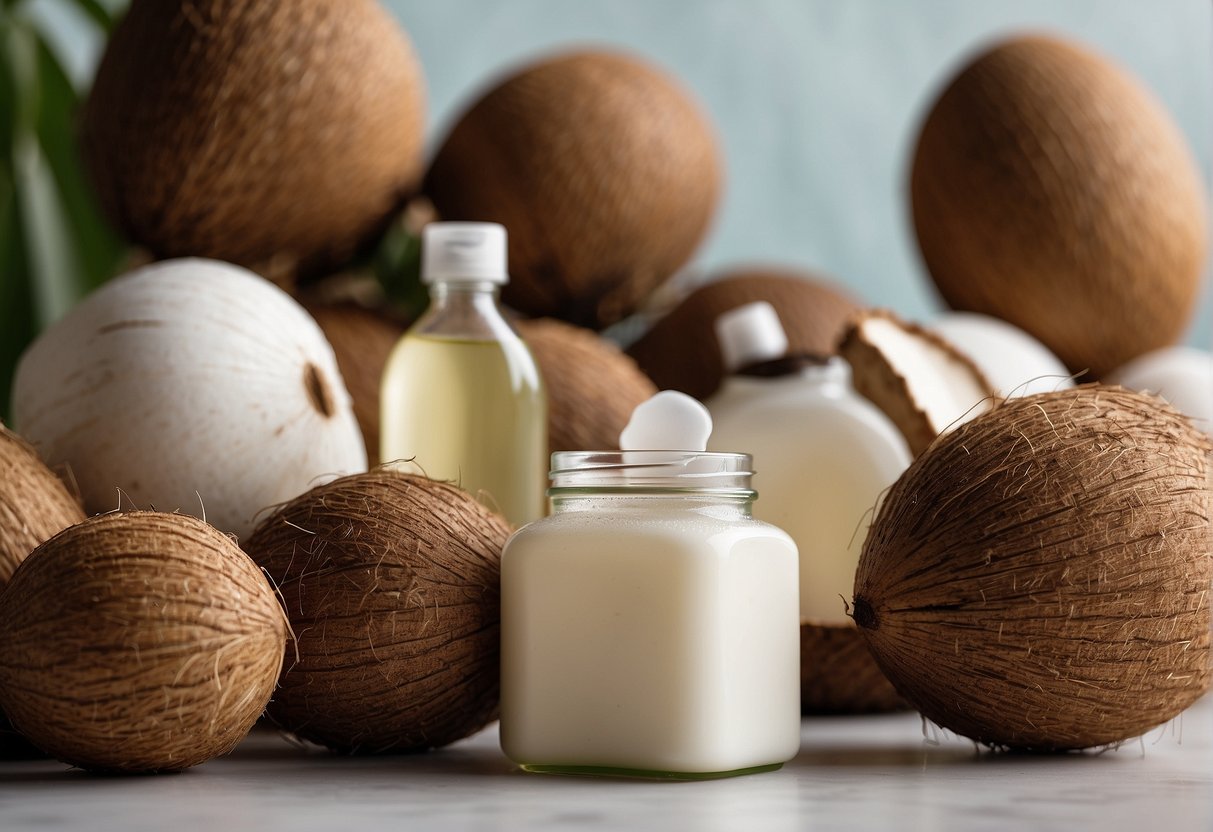
In this section, we address common queries regarding the use of Cocos nucifera, commonly known as coconut oil, in hair care products, specifically shampoos.
What are the potential benefits of Cocos nucifera (coconut) oil in hair care products?
Cocos nucifera oil has been shown to be effective in hair care due to its moisturizing properties. It can potentially prevent protein loss from hair when used as a pre-wash or post-wash grooming product, leading to stronger, healthier-looking hair.
Are there any comedogenic concerns associated with Cocos nucifera oil in hair care formulas?
While coconut oil is known to be comedogenic, this is typically a concern for skin care rather than hair care. In shampoos, the oil is formulated to clean and condition the hair without remaining on the skin long enough to clog pores.
Can Cocos nucifera oil in shampoos cause allergic reactions, and how can one identify such allergies?
Allergic reactions to Cocos nucifera oil are possible, though uncommon. Individuals with known sensitivities should check the ingredients on shampoo labels. Symptoms of an allergic reaction may include itching, redness, or swelling after the product's application.
How does Cocos nucifera oil compare with other common oils used in shampoos for nourishing hair?
Cocos nucifera oil is rich in fatty acids and has a unique molecular structure that allows it to penetrate the hair shaft. This can make it more effective at nourishing and repairing hair than some other oils that simply coat the hair.
Are shampoos that contain Cocos nucifera oil typically free from sulfates, and why is this significant?
Shampoos with Cocos nucifera oil are not inherently sulfate-free. However, sulfate-free formulas are gentle on the hair, and when combined with the natural benefits of coconut oil, they can help maintain hair's natural oils and prevent dryness.
What do user reviews typically say about the effectiveness of OGX Nourishing Coconut Milk Shampoo for preventing hair loss?
User reviews for OGX Nourishing Coconut Milk Shampoo often acknowledge its nourishing properties. However, it's important to note that while the shampoo may strengthen hair and prevent breakage, it's not specifically marketed for hair loss prevention.